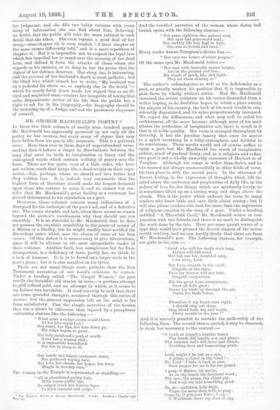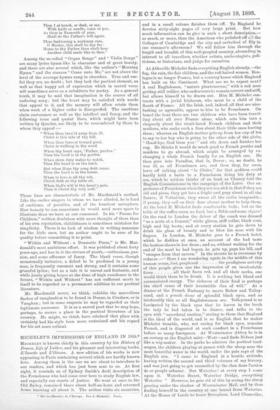MR. GEORGE MACDONALD'S POETRY.* IN these two thick volumes of
nearly nine hundred pages, Mr. Macdonald has apparently garnered up not only all the poetry he has written, but every scrap of rhyme that may have fallen from his pen in idle moments. This is a grievous error. More than ever in these days of superabundant verse- making does it behove a singer to discriminate between the song that owes its birth to imagination or fancy and the uninspired words which contain nothing of poetry save the form. There are few poets, even of a high order, who have not written much that hangs like a dead-weight on their repu- tation,—few, perhaps, whom we should not love better had they written less. It is, indeed, very reasonable that the highest form of literature should make the largest demands upon those who venture to assay it, and we cannot but con- sider that Mr. Macdonald's great facility as a verseman has proved detrimental to his reputation as a poet.
Moreover, these volumes contain many indications of a disregard for the technique of the poet's art, and of a defective ear. The verses stumble and halt, when there seems no reason beyond the author's carelessness why they should not run smoothly. It is no discredit to Mr. Macdonald that he does not possess the exquisite sensibility to the music of sound of a Milton or a Shelley, but he might readily have avoided the discordant notes which mar the charm of some of his best verses. Of this defect it is unnecessary to give illustrations, since it will be obvious to the most sympathetic reader of these volumes. Another fault, less conspicuous but far from unimportant, is a deficiency of taste, partly due, we think, to a lack of humour. It is to be found on a larger scale in the poet's prose ; but it is also manifest in his lyrics.
There are not many things more pathetic than the New Testament narratives of our Lord's relations to women. Under a heading called " The Gospel Women," the poet retells the beautiful old stories in verse,—a perilous attempt to gild refined gold, and an attempt in which, as it seems to us, failure was inevitable. It need scarcely be said that there are some graceful thoughts scattered through this series of verses ; but the general impression left on the mind is far from satisfactory. Can the simple narrative of the woman that was a sinner be otherwise than injured by a paraphrase containing stanzas like the following :— " What saint a richer crown could throw At his love-royal feet 1 Her tears, her lips, her hair down go, His reign begun to greet.
His holy manhood's perfect worth
Owns her a woman still ; It is impossible henceforth For her to stoop to ill.
Her hands and kisses, ointment, tears, Her gathered wiping hair, Her love, her shame, her hopes, her fears Mingle in worship rare."
The woman in the Temple is represented as standing :— " All in abandoned guilty hair, With terror-pallid lips,
To vulgar scorn her honour bare, To lewd remarks and quips."
* The Poetical Works of George Macdonald, 2 vole. London : Matto and Plin4uo. And the versified narrative of the woman Whom Satan had bound, opens with the following stanzas :— " For years eighteen she, patient soul, Her oyes had graveward sent ; Her earthly life was Iapt in dole, She was so bowed and bent."
Every reader knows Tennyson's divine line :— " Her eyes are homes of silent prayer." Of the same eyes Mr. Macdonald writes :— " Her eyes with heavenly reason bright, Are on the ground east low ;
His words of spirit, life, and light-- They sot them shining so."
The author's redundancies, as well as his deficiencies as a poet, so greatly weaken his position that it is impossible to• pass them by wholly without notice. Had Mr. Macdonald exercised the severe criticism on his verses demanded from a writer hoping, as he doubtless hopes, to retain a place among the singers of his country, the bulk of his work would be con- siderably diminished, and its value proportionately increased.
We regret his diffuseness, and what may well be called hie recklessness, all the more because although none of his work attains the perfection of imaginative art, there is much in it that is of noble quality. His verse is stamped throughout by sincerity, it has the peculiar beauty that owes its source to a spirit breathing in a lofty atmosphere, and faithful to its convictions. These merits would not of course suffice to equip a poet, but Mr. Macdonald has much of imaginative ardour, much of poetical fancy, and as a religious and reflec- tive poet is not a wholly unworthy successor of Herbert or of Vaughan. Although his range is wider than theirs, and he has roamed not always unsuccessfully in other fields of verse, his true place is with the sacred poets. In the utterance of devout feeling, in the expression of thoughts which lift the mind above the confusion and perplexities of daily life, in the ardour of love for the things which are spiritually lovely, he is sometimes lifted up on a strong wing, and sings above the clouds, This is the power which endears his verse to many readers who know little and care little about poetry ; but it will also please readers who look for more than the expression of religious emotion in the song of a poet. Under a heading entitled "A Threefold Cord," Mr. Macdonald writes in con- junction with two friends, and there is no mark to distinguish the work done by the trio. Here are some quaint verses of a type that would have pleased the devout singers of the seven- teenth century, and we can hardly doubt that these are from Mr. Macdonald's pen. The following stanzas, for example, are quite in his vein " Grief, who still for death doth long, Always self-abhorred, Has but one low, troubled song, I am sorry, Lard.
But Love singeth in the vault, Singeth on the stair ;
Even for Sorrow will not halt, Singeth everywhere.
Per the great Love everywhere, Over all doth glow;
Draws his birds up through the air,
Tends his birds below.
Therefore if my heart were right, I should sing out clear, Sing aloud both day and night, Every month in the year 1 ' And it is scarcely possible to mistake the authorship of the following lines. The second stanza quoted, it may be observed, is weak, but necessary to the context :— " 0 Lord, at Joseph's humble bench
Thy hands did handle saw and plane ; Thy hammer nails did drive and clench, Avoiding knot and humouring grain.
Lord, might I be but as a saw,
A plane, a chisel in thy hand !- No, Lord ! I take it back in awe, Such prayer for me is far too grand..
I pray, 0 Master, let me lie, As on thy bench the favoured wood ; Thy saw, thy plane, thy chisel ply, And work me into something good, No, no ; .ambition, holy-high, Urges for more than both to pray : Come in, 0 gracious Force, I cry- 0 Workman, share my shed of clay. Then I at bench, or desk, or oar, With knife or needle, voice or pen, As thou in Nazareth of yore, Shall do the Father's will again.
Thus fashioning a workman rare, 0 Master, this shall be thy fee : Home to thy Father thou shalt bear Another child made like to thee."
Among the so-called "Organ Songs" and " Violin Songs" are many lyrics hymn-like in character and of great beauty, and there are also several which, like the author's "Morning Hymn" and the stanzas " Come unto Me," are not above the level of the average hymns sung in churches. True and use- ful they are, no doubt ; but they lack the poetical element, as well as that happy art of expression which in sacred verse will sometimes serve as a substitute for poetry. As a general truth, it may be said that imagination is the source of all enduring song ; but the heart may be satisfied with words that appeal to it, and the memory will often retain them when work of a higher order is disregarded. The emotions claim sustenance as well as the intellect and fancy, and the following terse and quaint lines, which might have been written by Quarles, are likely to be remembered by those to whom they appeal :- " When thou turn'st away from ill, Christ is this side of thy hill.
When thou tamest toward good, Christ is walking in thy wood.
When thy heart says, 'Father, pardon!' Then the Lord is in thy garden.
When stern duty wakes to watch, Then His hand is on the latch.
But when Hope thy song doth rouse, Then the Lord is in the house.
When to love is all thy wit, Christ doth at thy table sit.
When God's will is thy heart's pole, Thon is Christ thy very soul."
These lines are characteristic of Mr. Macdonald's method. Like the earlier singers to whom we have alluded, he is fond of emblems, of parables, and of the homliest metaphors. How homely he can sometimes be would need more space to illustrate than we have at our command. In his " Poems for Children," written doubtless with more thought of them than of his own reputation, childishness is sometimes mistaken for simplicity. There is no lack of wisdom in writing nonsense for the little ones, but an author ought to be sure of its quality before committing it to print.
" Within and Without : a Dramatic Poem," is Mr. Mac- donald's most ambitions effort. It was published about forty years ago, and has in it the virtues of youth,—enthusiasm, pas- sion, and some affluence of fancy. The blank verse, though occasionally imitative, a defect to be pardoned in a young
man, is frequently resonant and strong, and it contains some graceful lyrics ; but as a tale it is unreal and fantastic, and while justly giving hopes at the time of high excellence in the future, " Within and Without" has not -sufficient merit in itself to be regarded as a permanent addition to our poetical literature.
Mr. Macdonald never, we think, exhibits the marvellous sashes of imagination to be found in Donne, in Crashaw, or in Vaughan ; but in some respects be may be regarded as their legitimate successor. It is as a sacred poet that be may hope, perhaps, to secure a place in the poetical literature of his country. He might, we think, have attained that place with certainty had his style been more restrained and his regard for his art more critical.



































 Previous page
Previous page